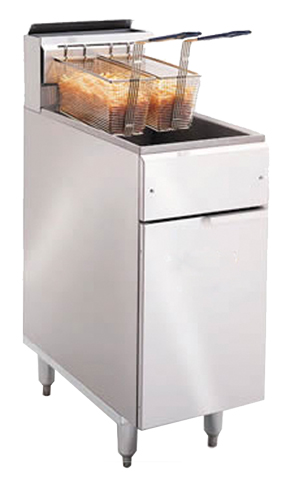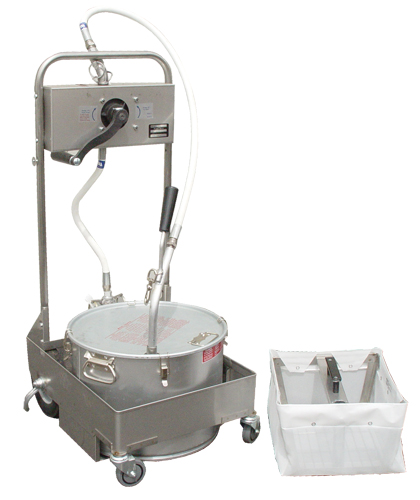 The fryer is one of the central cooking appliances in many restaurants and commercial kitchens. And central to every commercial fryer is the shortening or oil in the vat. Maintaining that oil is key to producing great-tasting product every time. Oil maintenance is more involved than you might think, and if done properly, can add significant time to the productive life of your fryer oil and improve the taste of your product.
The fryer is one of the central cooking appliances in many restaurants and commercial kitchens. And central to every commercial fryer is the shortening or oil in the vat. Maintaining that oil is key to producing great-tasting product every time. Oil maintenance is more involved than you might think, and if done properly, can add significant time to the productive life of your fryer oil and improve the taste of your product.
Fryer oil is an organic compound. That means it breaks down naturally over time, just like any of the food product in your walk-in. At over 300 degrees Fahrenheit, that degradation process is accelerated. As if that weren’t enough, three things contribute to the even more rapid deterioration of fryer oil:
- Oxidation – contact with air makes the oil “stale” over time, just like a bag of chips.
- Hydrolysis – the presence of water in fryer oil is unavoidable when frying food product, but as water interacts with the hot oil, acidic compounds form that can really affect taste.
- Polymerization – As oil breaks down, compounds form and bond together, which leads to surface foaming and the further breakdown of oil quality and taste. This process is made even worse by food particles, which will inevitably collect in the oil as product is cooked.
There are several things you can do to combat the three enemies of oil quality. Here’s some tips that address each one specifically:
Fighting oxidation: minimize fryer oil contact with the air whenever possible. The most common method for doing this is to cover the fryer vat when the unit is shut down. Also regulate oil temperature so that it doesn’t exceed 360 degrees Fahrenheit. During lulls, reduce heat to 280 degrees.
Fighting hydrolysis: don’t fill fryer baskets directly over the fryer vat. This is especially true for frozen product, because ice crystals will end up in the oil. Of the three, hydrolysis is the hardest to fight, because there is going to be water in everything you cook.
Fighting polymerization: again, don’t fill fryer baskets over the vat. Food particles speed polymerization, so a good technique is to load the fryer basket away from the vat and give it a few good shakes to allow any free particles to fall away before the product takes the plunge. Another polymerization agent are seasonings, especially salt. Add any seasoning away from the vat to keep them out of the oil as much as possible.
Of course, no matter how hard you fight, eventually it’s going to be a losing battle. Water, air, and particulates are going to end up in your fryer oil no matter what you do. Your only choice is to take them back out before the oil breaks down. You can do this effectively with a good filtration system.
How much you filter your fryer oil depends on what you’re cooking, in what volume, and how often. In general, breaded foods like fried chicken or fish mean you should filter more often, because of all the food particles that are going to end up in the oil. French fries are much cleaner and therefore the oil can handle a lot more rounds before filtering.
 No matter what, you should develop a filtering schedule. Fryer oil test strips are the best way to keep track of oil quality, and they’ll give you a starting point for your filter schedule. Filtering fryer oil greatly extends the life of the oil, and smart restaurant operators filter the same oils several times to get the maximum life out of it before having to refill.
No matter what, you should develop a filtering schedule. Fryer oil test strips are the best way to keep track of oil quality, and they’ll give you a starting point for your filter schedule. Filtering fryer oil greatly extends the life of the oil, and smart restaurant operators filter the same oils several times to get the maximum life out of it before having to refill.
Portable fryer filters provide an easy way to filter fryer oil without slowing your busy kitchen down too much. And when you’ve squeezed every last minute of cooking capability out of that vat of oil, dispose of it safely with an oil transporter. Finally, use a Smart Spout for pouring new oil into the vat without spilling.
Before you refill with a new batch of oil, however, you’ve got to clean that fryer vat out. It’s a thankless job, but someone’s got to get in there and remove as much of that great friends of polymerization, food particulates, as possible. Especially focus on cleaning the “cool zone,” the area underneath the burners in the vat where particles are intentionally concentrated in order to prevent them from heating up too much during cooking. A water/vinegar mix is a great way to make sure detergents are neutralized after you’ve thoroughly cleaned the vat.
Maintaining fryer oil quality takes a lot of work. But in the end, it’s worth the extra effort because you get a lot more mileage out of each vat of oil. And if saving money isn’t enough of an incentive for you, then the prospect of serving great tasting fried foods to your customers every time should do the trick.
If you’re in the market for a new fryer, check out this commercial fryer buying guide.
 Corner Booth Blog | TundraFMP Restaurant Supply, News & Equipment Blog
Corner Booth Blog | TundraFMP Restaurant Supply, News & Equipment Blog




Hi
My fryer pilot goes out sporatically as the gas engages to heat up and has to be relit. We’ve changed the thermopile and it didn’t fix the issue. Any ideas would be appreacied.
Thank You
Robert Higgins
Robert, it sounds like it’s either a thermostat or combination gas safety valve issue.
I work at a chain restaurant and the GM there doesn’t want us to filter the fryers at close but instead wait til open to do it. Is that safe for the oil?
Hi Wally,
A benefit of waiting until the morning is that the oil will be cooled, keeping you safe by ensuring you won’t get burned. We don’t think it’ll affect the quality of the oil either way.
– Tundra Team
Should you use a powder like pitco to extend your oil quality and life along with filtering??
Is there a natural product that can be used that is safer than the pitco powder??
My boss and I are having a debate over frying bacon and prepared meatballs in the fryer at work . I say it breaks down the oil and turns it brown faster and sh e says not which one is right.